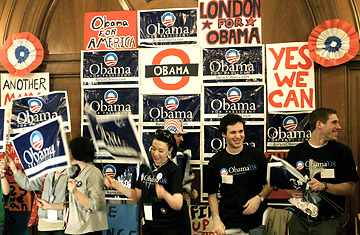
Barack Obama supporters chant in Porchester Hall, Bayswater, London, Tuesday, Feb. 5, 2008.
Amid the cacophony of placard-wielding Clinton and Obama supporters trading slogans and insults, or just bellowing greetings to newcomers pushing into the hall, Bill Barnard pleads for attention. "Ladies and gentlemen," says the chairman of the British branch of Democrats Abroad, "we have a serious problem." To anyone unaccustomed to the rowdy caucus tradition, that statement might seem self-evident. "It's chaos," says Barbara Lewis, a 64-year-old American who has lived abroad for 37 years and, until tonight, had never cast a vote. Like the hundreds of U.S. citizens still queuing to enter the building and the hundreds more already inside, Lewis has been lured by the chance to participate in the Democrats' first-ever Global Primary, a rolling eight-day event that kicked off on Super Tuesday and is designed to allow expatriate Democrats to vote in 33 countries, from the Dominican Republic to Cambodia. The Global Primary also offers them the option of voting by fax or online. The global tally will be announced on Feb. 21, and it will determine the selection of 22 delegates commanding 11 votes at the Democratic Convention in August.
Each branch of Democrats Abroad made its own unique voting arrangements. In Vienna, which was celebrating its annual Fasching carnival with traditional masked revelries, an "Abraham Lincoln" voted alongside a "Hillary Clinton" and a cowgirl. Voters in New Delhi were given donkey-shaped cookies. London, home to 200,000 Americans, staged the most ambitious event — a Feb. 5 primary with caucus-like elements such as a public show of support for the two candidates.
It was not quite a triumph of logistics. The organizers just hadn't reckoned with the outpouring of exuberance of overseas Americans given an opportunity to cast off the taint of the Bush years. Democrats Abroad U.K. had booked Porchester Hall, a grand Victorian edifice built for public functions, which ought to have been roomy enough. Pop star Elton John celebrated his birthday there with a few hundred of his closest friends in 1994, and the complex has regularly accommodated large-scale awards ceremonies and posh parties. The Dems had arranged volunteers to man the registration desks, and more to serve refreshments. (Even the press were treated to Hostess cupcakes and Twinkies.) Valda Aviks, a doyenne of musical theater most recently seen as Zandra the Crack Whore in a production of Jerry Springer—the Opera turned her considerable lung power to a rendition of The Star Spangled Banner which drew rapturous cheers at the top notes.
Yet the turnout (more than 1,900 people had been counted through the doors halfway through the four-and-half-hour event) exceeded all expectations — and the capacity of the venue. When he finally managed to make himself heard, Barnard announced that the rest of the planned progam, including speeches in favor of Barack Obama and Hillary Clinton, would be scrapped. He asked people who had already voted to leave so that the hordes "standing five-deep" in the street could come in. Bob Worcester, the founder of research company MORI, an active member of Democrats Abroad since he moved to England in 1969, laughed ruefully. "If we were organized, we'd be Republicans," he said.
That's not strictly true. Republicans didn't bother with any such shenanigans. Their overseas supporters are expected to vote by postal ballot in their home states. Republicans Abroad U.K. holds fundraisers and social get-togethers such as the first meeting of its Young Republican branch, a staid gathering where some two dozen fresh-faced professionals and students met up, also on Super Tuesday, in a central London bar. One of their number, banker Allison Bruneau, 28, says she's encountered a view among Britons that supporters of President Bush "drive pick-up trucks" and pine for slavery. "One of the things that's really frustrated me is this feeling that to be at all interested in international affairs or be open-minded you can't be a Republican," she said. "Sometimes I feel like I'm an ambassador."
"After eight years of Bush and our standing in the world so badly damaged, there's no other constituency that so understands that," says Carolyn Sauvage-Mar, who chairs Democrats Abroad in India. Whatever their personal politics, the 6 million Americans living abroad have found themselves at the sharp end of growing international opposition to U.S. foreign policy.
And, perhaps expressing this desire for a clean break with the past, early signs were that many overseas Democrats view Obama as their best hope for repairing relations with an outside world they know much more intimately than does anyone inside the Beltway. Obama's supporters looked to outnumber Clinton's in London; mock caucuses in the Ukraine and Indonesia produced hefty majorities for the Illinois senator.
"I've never seen any animosity towards me but towards the government that purports to represent me, great animosity," says Lewis. She was born into a Republican family but is now an ardent Obama fan. "This is the first time there's been a candidate who's so right for us," she says. "I think I'm going to get my America back."
— With reporting by Laura Blue/London and Simon Robinson/New Delhi
